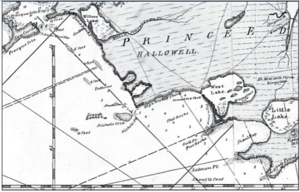Scotch Bonnet Island
Scotch Bonnet Island is a small island in Lake Ontario.[1][2] It is part of Prince Edward County, Ontario, Canada.
The island is a low, bare, limestone outcropping, approximately 4 km (2.49 mi) off the western shore of the Quinte peninsula.[2] It is named after Scotch Bonnet Ridge, a nearby glacial feature, a north–south belt of glacio-lacustrine clay and till.
The possibility of operating a lighthouse on the island was explored as early as 1844.[3] Funds were found to construct a lighthouse after the ship Christiana was wrecked on the island in 1851.
A traditional stone lighthouse was first erected on the island in 1856.[2] It was replaced with a steel navigation tower in 1959. Ownership of the island was transferred to the Canadian Wildlife Service in 1979, after the Department of Transport declared it surplus. Later that year it was named the Scotch Bonnet Island National Wildlife Area.
Like other similar islands, the island is an important resting spot for birds migrating across the lake.[2] During breeding season large numbers of waterbirds, like herring gulls and double-crested cormorants, raise their young on the island.[4]
References
- ↑ C.H.J. Snider. "They miss the Old Scotch Bonnet", The Evening Toronto Telegram, 1942-07-25.
- ↑ 2.0 2.1 2.2 2.3 Scotch Bonnet Island and Mohawk Island National Wildlife Areas Management Plan.
- ↑ Marc Seguin. For Want of a Lighthouse: Building the Lighthouses of Eastern Lake Ontario 1828–1914, Trafford Publishing, 2015.
- ↑ Scotch Bonnet Island National Wildlife Area. “In 2009, Scotch Bonnet Island was the eighth largest cormorant colony (896 nests) in the Canadian waters of Lake Ontario.”
